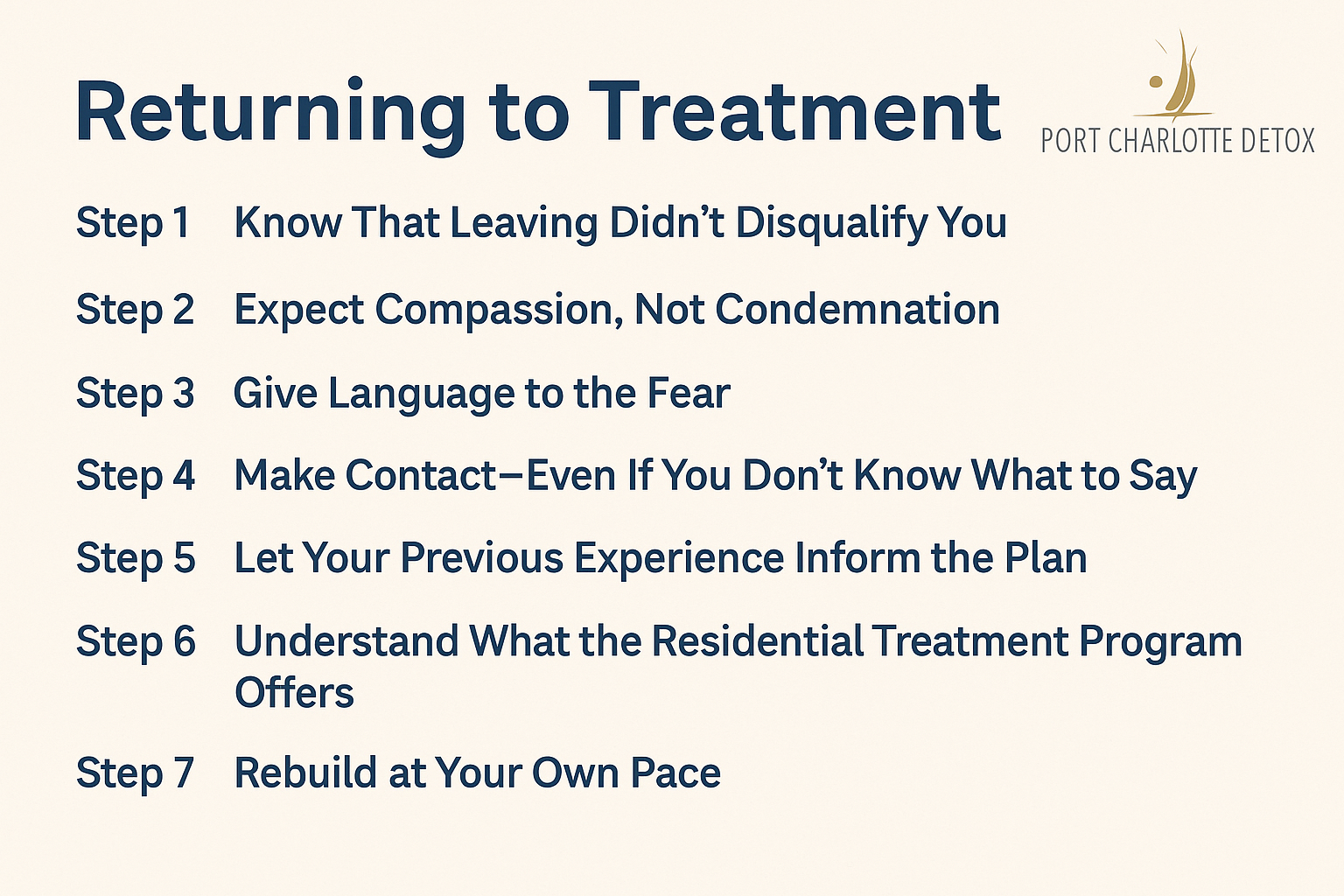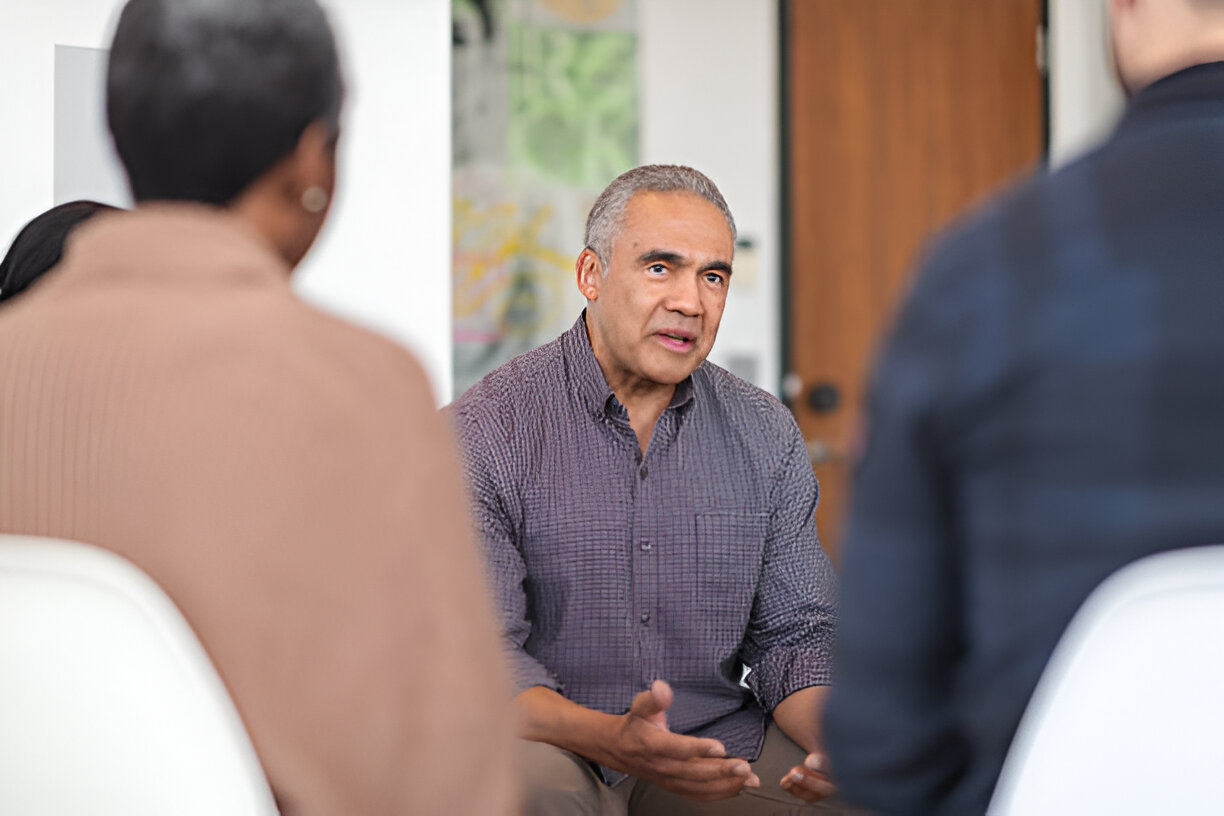You left.
Maybe you packed your things in the middle of the night. Maybe you told yourself, “I just need a break.” Or maybe you ghosted—no message, no call—just disappeared.
And now you’re here, wondering if it’s too late to come back.
If you’ve walked away from treatment and want to return but feel paralyzed by fear or shame, this is for you. Because the truth is—you’re not the only one. And the door is still open.
At Port Charlotte Detox, our Residential Treatment Program is built for people who’ve taken detours. We know that recovery isn’t linear. And we know that walking back in the second time (or third, or seventh) can be the bravest step of all.
Step 1: Know That Leaving Didn’t Disqualify You
You don’t get kicked out of healing just because you had to pause.
So many people leave treatment for real reasons—fear, burnout, triggers, family needs, shame, relapse. You are not weak for leaving. You are not “noncompliant.” You are someone who hit a wall—and like most humans—you backed away.
Coming back doesn’t erase the fact that you left.
It honors the fact that you’re still trying.
We don’t expect perfection. We expect people.
And people—especially the ones in pain—sometimes leave before they’re ready to stay.
Step 2: Expect Compassion, Not Condemnation
Here’s what won’t happen when you reach out:
- You won’t be scolded.
- You won’t be punished.
- You won’t be met with “Why did you leave?”
Here’s what will happen:
- You’ll be asked how you’re doing now.
- You’ll be asked what you need this time.
- You’ll be welcomed with warmth, not suspicion.
At Port Charlotte Detox, we’ve walked this path with clients from Charlotte County to Fort Myers, FL, and we know how powerful a second start can be. Some of our strongest success stories come from people who thought they wouldn’t be allowed back.
Step 3: Give Language to the Fear
Let’s call it what it is.
Coming back after you’ve left can feel humiliating. It’s vulnerable. You might worry that you’ve disappointed people—or worse, disappointed yourself.
Here are some thoughts we’ve heard from people thinking of returning:
- “I ghosted. They probably hate me.”
- “I feel like I blew my shot.”
- “What if they don’t believe I’m serious this time?”
- “I don’t want to walk in and feel like a failure.”
If this is you, know this: shame thrives in silence. But the moment you name it, it starts to loosen.
You don’t need to pretend it doesn’t hurt. Just let someone hold that weight with you.

Step 4: Make Contact—Even If You Don’t Know What to Say
You don’t need a perfect apology or explanation. You just need a few honest words.
Try something like:
“I left treatment earlier, but I’d like to come back. Can we talk about what that would look like?”
Or even:
“I’m not sure what to say, but I think I need help again.”
That’s enough.
That’s more than enough.
The hardest part is reaching out. After that, we’ll walk with you through the rest.
Step 5: Let Your Previous Experience Inform the Plan
We won’t pretend your last time here didn’t happen. But we also won’t use it against you.
Instead, we’ll ask:
- What didn’t work for you last time?
- What felt too hard, too fast, or too much?
- What do you need this time that you didn’t have before?
- What strengths did you discover—even if it didn’t end how you hoped?
This is how we build a plan that actually fits. It’s not about redoing the same thing—it’s about making space for a new experience, one that accounts for the whole you, not just your symptoms.
Step 6: Understand What the Residential Treatment Program Offers
Our Residential Treatment Program in Port Charlotte is structured, supportive, and stabilizing—but never punishing.
If you return, here’s what to expect:
- A clean slate with a familiar team
- Medically monitored detox if needed
- Trauma-informed therapy that meets you where you are
- Space to talk about why you left and why you’re back
- Practical planning for your life outside treatment
- Emotional support that doesn’t hinge on your “success”
This isn’t about forcing you to stay. It’s about helping you find your footing, again—and again, if needed.
Step 7: Rebuild at Your Own Pace
If you’re returning after leaving, it’s okay to feel unsure. It’s okay to move slowly.
You don’t have to dive headfirst into vulnerability. You don’t have to have a “comeback plan.” You just have to show up with some willingness.
We’ll take the pressure off. We’ll help you settle back in. And we’ll remind you—every day—that coming back was not a sign of weakness. It was a signal that hope still lives in you.
Real People Leave and Come Back—And Still Heal
Here’s the truth: Some of the strongest recoveries we’ve witnessed didn’t begin on Day 1. They began on Day 22, after someone returned.
They came back quieter. Tired. Unsure.
But they came back.
And that moment—that second try—changed everything.
You are allowed that moment too.
FAQs About Returning to Residential Treatment
I left without notice. Will I be allowed back?
Yes. We don’t require you to explain everything. If you’re reaching out to return, we’ll work with you to restart your care.
Will I be judged by staff or other clients?
No. Our staff is trained to respond with empathy, not shame. Many clients return after leaving—it’s more common than you think.
Do I need to start the entire program over?
Not necessarily. We’ll reassess your needs and create a plan that reflects what you’ve already done and what you still need.
What if I relapsed after leaving?
You’re still welcome. Relapse doesn’t void your ability to get help—it increases your need for support. We won’t turn you away.
How long can I wait before returning?
There’s no expiration date on healing. Whether it’s been a few days or several months, you’re still eligible to return.
Is this kind of care available near me?
Yes. We serve individuals across Charlotte County and Fort Myers, FL with compassionate, high-quality residential care.
Your Next Step Matters—Even If It’s a Return
Leaving treatment doesn’t make you a failure.
Coming back doesn’t mean you’re behind.
It means you still believe in something. It means you want your life back. It means you’re willing to try again—even with a shaky voice and a heavy heart.
That’s not weakness. That’s resilience.
Call (844)336-2690 to learn more about our Residential Treatment Program services in Port Charlotte, Florida.


